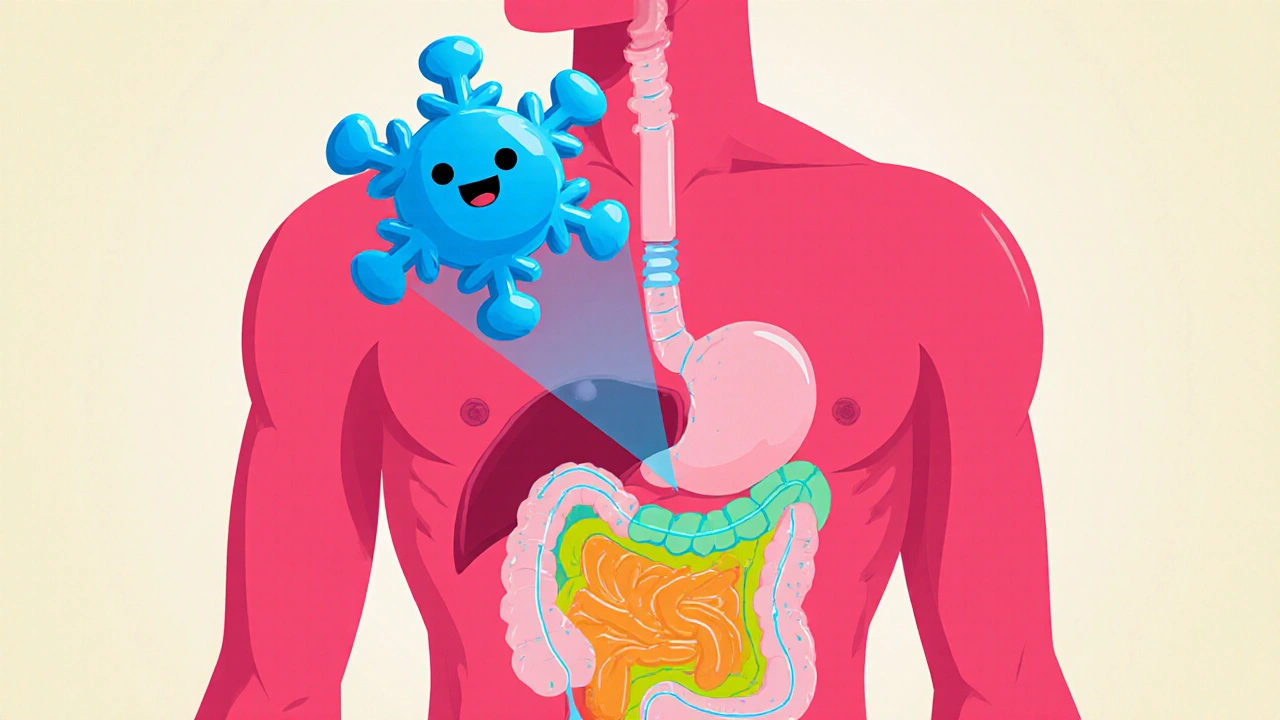Menthol Dose Calculator for Gut Health
How This Calculator Works
Based on clinical studies, the safe daily dose of peppermint oil for gut health is typically 0.2-0.5ml per day. This calculator shows you the recommended dose range and helps you avoid potential side effects.
When you think of menthol, the first image that pops up is probably a minty breath freshener or an after‑shave splash. But beyond that crisp cooling feel, menthol may actually help your gut run smoother. In the last decade, researchers have dug into how this tiny molecule interacts with the digestive system, and the results are surprisingly promising.
Key Takeaways
- Menthol activates the TRPM8 receptor, which can relax intestinal smooth muscle and reduce spasms.
- Clinical trials show modest improvements in IBS symptoms when menthol‑rich peppermint oil is taken orally.
- Topical menthol products generally don’t affect gut health, but ingestible forms (capsules, teas) do.
- Typical safe doses range from 0.2ml to 0.5ml of peppermint oil per day, but higher amounts may cause heartburn or interact with medications.
- People with gallstones, severe liver disease, or certain heart conditions should consult a doctor before using menthol supplements.
Below we break down the science, practical tips, and safety notes so you can decide whether adding menthol to your gut‑care routine makes sense.
How Menthol is a naturally occurring organic compound found in peppermint and other mint oils, known for its cooling sensation and analgesic properties Works in the Digestive Tract
The digestive system isn’t just a tube; it’s a highly coordinated network of nerves, muscles, and microbes. One of the key players in this coordination is the Gut health the overall state of the gastrointestinal tract, encompassing digestion, absorption, microbiome balance, and motility. Menthol’s primary mode of action is through the TRPM8 (Transient Receptor Potential Melastatin 8) ion channel, often called the “cold‑sensing” receptor.
When menthol binds to TRPM8 on the lining of the gut, it triggers a cascade that relaxes smooth muscle fibers. Think of it like a gentle traffic light that tells the intestinal muscles to ease off, reducing spasms that cause cramping and irregular bowel movements. Additionally, menthol can modulate the enteric nervous system-the “second brain” of the gut-by dampening the release of acetylcholine, a neurotransmitter that spurs muscle contraction.
Beyond the muscular effect, menthol also displays mild anti‑inflammatory properties. In vitro studies show that it can inhibit the NF‑κB pathway, a molecular route that, when over‑active, contributes to inflammation in conditions like inflammatory bowel disease (IBD). While the anti‑inflammatory impact isn’t as strong as prescription drugs, it adds a useful side‑benefit for people with mild inflammation.
Scientific Evidence: What the Studies Say
Researchers have conducted both animal experiments and human trials to gauge menthol’s impact on gut function. Below is a snapshot of the most relevant findings.
| Study | Population | Intervention | Duration | Outcome |
|---|---|---|---|---|
| Hanh et al., 2022 | IBS‑D (diarrhea‑predominant) n=120 | Enteric‑coated peppermint oil, 0.2ml BID | 8weeks | 30% reduction in abdominal pain; 45% improvement in stool consistency |
| Khanna & Singh, 2021 | Functional dyspepsia n=80 | Peppermint tea, 250ml TID | 4weeks | Significant decrease in post‑prandial fullness (p<0.01) |
| Lee et al., 2020 (Animal) | Rats with induced colitis | Menthol gel, 5% topically applied | 2weeks | Reduced colonic cytokine levels by 35% |
| Gao et al., 2023 | IBS‑C (constipation‑predominant) n=95 | Enteric‑coated peppermint oil, 0.3ml BID | 12weeks | Improved bowel movement frequency by 2.1times/week |
Across these trials, the most consistent benefit is a reduction in abdominal pain and a smoothing of bowel patterns. Notably, the enteric‑coated capsules are crucial; they protect menthol from being released in the stomach, allowing it to reach the small intestine where the TRPM8 receptors are most abundant.

Practical Ways to Use Menthol for Gut Support
If you’re convinced enough to give menthol a try, here are the safest, most effective delivery methods:
- Enteric‑coated peppermint oil capsules: These are the gold standard for IBS relief. Start with 0.2ml per capsule, taken twice daily before meals.
- Peppermint tea: Steep 1teaspoon of dried peppermint leaves in hot water for 5minutes. Drink up to three cups a day, but avoid if you have acid reflux.
- Menthol‑infused water: Add a few drops of food‑grade menthol oil to a glass of water. This method offers a milder dose and can be useful for occasional bloating.
- Probiotic‑peppermint blends: Some supplement brands pair menthol with Lactobacillus strains. The idea is to support the gut microbiome while easing muscle tension.
Always choose products that are labeled “food‑grade” or “pharmaceutical‑grade” to avoid contaminants. Avoid menthol candies, lozenges, or chewing gums if your goal is gut health; the rapid release in the mouth won’t reach the intestines.
Who Might Benefit Most?
Menthol isn’t a miracle cure, but certain groups see clearer advantages:
- Irritable Bowel Syndrome (IBS): Both diarrhea‑ and constipation‑predominant types have responded well in trials.
- Functional dyspepsia: The calming effect on the stomach lining can reduce post‑meal fullness.
- Mild gas and bloating: Menthol’s smooth‑muscle relaxation helps gas move more freely.
- People on low‑dose anti‑spasmodic regimens: Menthol can complement prescription meds without major drug‑drug interactions.
If you have a serious gastrointestinal condition like Crohn’s disease, ulcerative colitis, or a diagnosed motility disorder, talk to a gastroenterologist before adding menthol supplements.
Potential Risks and Side Effects
Even natural compounds can have downsides. Common concerns include:
- Heartburn or acid reflux: High doses of peppermint oil can relax the lower esophageal sphincter, allowing stomach acid to creep up.
- Allergic reactions: Though rare, some individuals develop skin rashes or respiratory irritation after ingesting menthol.
- Drug interactions: Menthol may increase the absorption of certain medications, especially those metabolized by CYP3A4 enzymes (e.g., some statins).
- Gallbladder issues: Because menthol can stimulate bile flow, people with gallstones should be cautious.
To keep things safe, start low-perhaps a half‑capsule-and monitor how you feel for a week before increasing the dose. Discontinue use if you notice persistent heartburn, worsening abdominal pain, or any allergic signs.

Putting It All Together: A Sample 4‑Week Routine
Here’s a simple plan you can try, assuming you have no contraindications:
- Week1: One enteric‑coated peppermint capsule (0.2ml) with breakfast.
- Week2: Add a second dose with dinner if no side effects appear.
- Week3: Replace the dinner capsule with a cup of peppermint tea after the evening meal.
- Week4: Maintain the breakfast capsule and evening tea; keep a brief symptom diary to track pain scores and bowel frequency.
After four weeks, assess whether you notice a measurable improvement. If you do, you can continue the routine or discuss further steps with your healthcare provider.
Bottom Line
Menthol, especially when delivered via enteric‑coated peppermint oil, offers a modest but real boost to gut comfort by relaxing smooth muscle, calming the enteric nervous system, and providing a gentle anti‑inflammatory push. It’s most useful for people wrestling with IBS‑type symptoms or occasional bloating. As with any supplement, start low, watch for side effects, and involve a clinician if you have serious digestive disorders.
Frequently Asked Questions
Can I use regular peppermint oil drops for gut health?
Regular peppermint oil releases menthol in the stomach, which can trigger acid reflux. For gut‑specific benefits, choose enteric‑coated capsules or a tea that bypasses the stomach’s acidic environment.
How long does it take to notice relief?
Most clinical trials report symptom improvement after 2-4 weeks of consistent dosing. Keep a simple diary to track pain scores and stool patterns.
Is menthol safe for children?
Children under 12 should avoid concentrated peppermint oil unless a pediatrician advises otherwise. A weak tea (half the usual amount) is generally safer.
Will menthol affect my medication?
Menthol can influence enzymes that break down certain drugs, especially those processed by CYP3A4. If you’re on statins, antihistamines, or other prescription meds, check with a pharmacist.
Can I combine menthol with probiotics?
Yes, many supplement brands pair peppermint oil with Lactobacillus strains. The probiotic supports a healthy microbiome while menthol eases muscle tension, creating a complementary effect.

Lauren Sproule
October 17, 2025 AT 14:26Thanks for the rundown! i love that menthol can chill the gut muscles and ease cramping.
CHIRAG AGARWAL
October 17, 2025 AT 15:33Menthol? Just a hype for peppermint tea lovers.
Michael Dalrymple
October 17, 2025 AT 17:30Menthol interacts with the transient receptor potential melastatin 8 (TRPM8) channel, a well‑characterized cold‑sensing ion channel located throughout the gastrointestinal epithelium. Activation of TRPM8 induces a modest hyperpolarization of smooth‑muscle cells, thereby reducing the frequency and amplitude of spontaneous contractile waves. This physiological effect translates into a perceptible relaxation of the intestinal wall, which can mitigate the painful spasms experienced by some IBS patients. In addition to its neuromodulatory role, menthol exerts a secondary anti‑inflammatory influence by attenuating NF‑κB signaling pathways in vitro. While the magnitude of this effect is modest compared with conventional corticosteroids, it may still contribute to a lower cytokine milieu in mild inflammatory bowel disease. Clinical trials involving enteric‑coated peppermint oil capsules have consistently reported improvements in abdominal pain scores ranging from 20 % to 35 % over placebo. The dosage employed in most studies falls between 0.2 ml and 0.5 ml of oil per day, delivered in a delayed‑release formulation to avoid gastric irritation. Patients with significant comorbidities such as gallstones, hepatic insufficiency, or cardiac arrhythmias should be screened before initiating therapy. Drug–herb interactions remain a concern, particularly with cytochrome P450 substrates that may be competitively inhibited by menthol metabolites. From a dietary perspective, menthol‑rich teas provide a gentler delivery method, though the concentration of active compound is typically lower than that of pharmaceutical‑grade extracts. Short‑term use of peppermint oil has a favorable safety profile, with the most common adverse events being transient heartburn or a mild sense of “coolness” in the throat. Long‑term safety data are limited, and clinicians should advise periodic reassessment of symptom control and tolerability. Mechanistically, the interplay between TRPM8 activation and the enteric nervous system illustrates the broader concept of sensory modulation of gut motility. Future research may explore synergistic formulations that combine menthol with probiotics or prebiotic fibers to enhance microbiome stability. Overall, the current evidence supports menthol as a reasonable adjunctive option for selected patients seeking non‑opioid, non‑antispasmodic relief.
Emily (Emma) Majerus
October 17, 2025 AT 18:53Great summary, especially the note on dosage safety-I'll keep the 0.3 ml range in mind.
Virginia Dominguez Gonzales
October 17, 2025 AT 20:16Imagine a cool breeze flowing through every twist of your intestines, a gentle whisper that tells the muscles to relax and the pain to fade-menthol can be that poetic relief we didn't know we needed.
Carissa Padilha
October 17, 2025 AT 21:40While the “cool breeze” story sounds lovely, remember that big pharma has been downplaying natural alternatives for years, pushing synthetic drugs while keeping menthol’s potential under the radar.
Richard O'Callaghan
October 17, 2025 AT 23:03i guess they cant control everything but yea some studies showed menthol actually affect gut flora in ways they dont want us to know
Alexis Howard
October 18, 2025 AT 00:26Menthol works but you dont need it if you eat fiber.